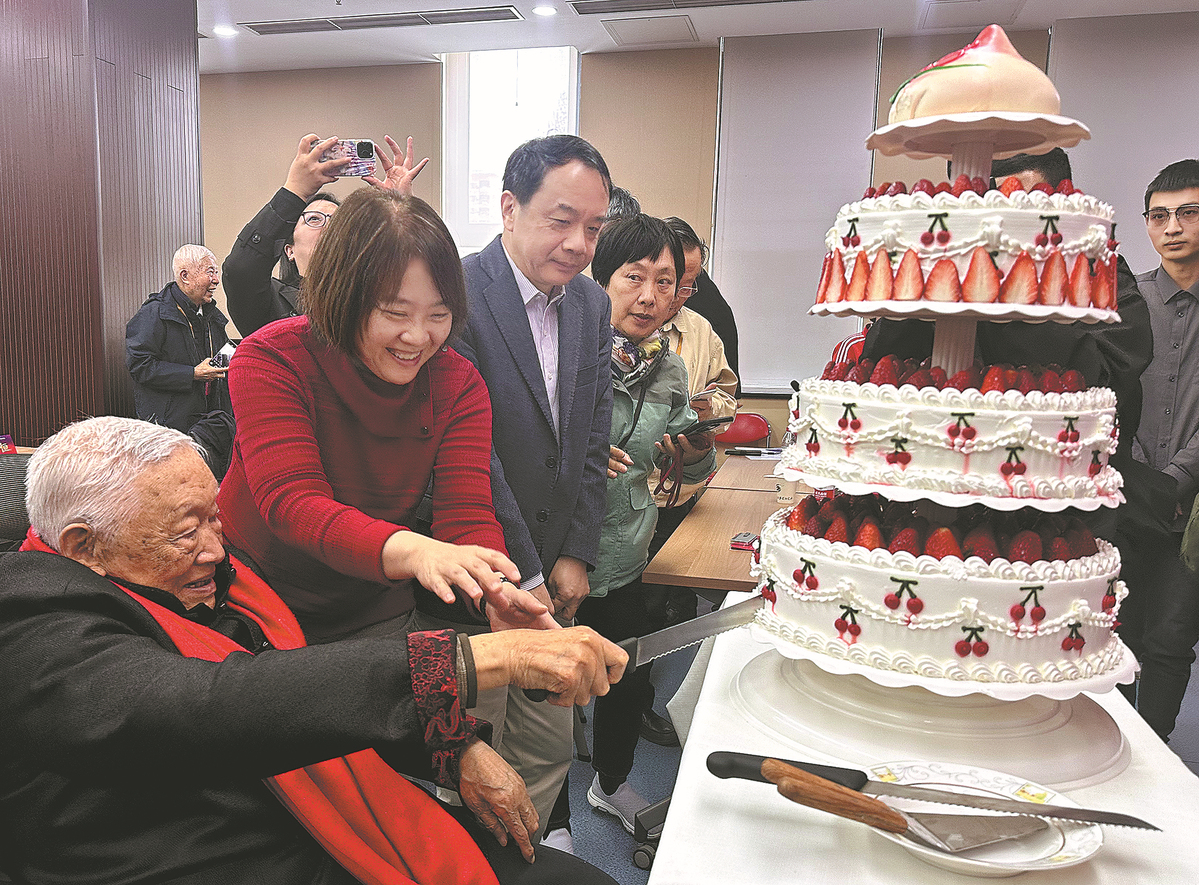Physicist donates 3m yuan to support young researchers on 100th birthday
China Daily2024-04-04 12:11

Ye Minghan (left), a renowned physicist and academician of the Chinese Academy of Engineering, cuts a cake to celebrate his 100th birthday in Beijing on Tuesday. [Photo by Yan Dongjie/China Daily]
On his 100th birthday, Ye Minghan, a renowned physicist and academician of the Chinese Academy of Engineering, donated 3 million yuan ($415,000) from his personal savings to the Education Foundation of the University of the Chinese Academy of Sciences to support young researchers in the field of high-energy physics.
On Tuesday, dozens of physicists, including several academicians, gathered at CAS' Institute of High Energy Physics to cut a cake, offer blessings, sing birthday songs and celebrate Ye's birthday.
Ye is one of the pioneers in high-energy physics research in China. Around the time of the founding of the People's Republic of China in 1949, inspired by Qian Sanqiang's encouragement that "China must develop its own nuclear physics", Ye enrolled in the graduate school of Tsinghua University and conducted research in nuclear physics under the guidance of Qian.
Academician Wang Yifang, director of the institute, said that in the 1950s, during a time of extreme poverty, Ye participated in the development of China's first and second electrostatic particle accelerators, which are crucial foundations for high-energy physics.
Starting in the 1980s, during the construction of the Beijing Electron-Positron Collider, Ye was responsible for the design and construction of the Beijing Spectrometer, and as the institute's second director, he led the development of the collider.
The Beijing Electron-Positron Collider is one of the world's eight major high-energy accelerator centers, the first high-energy accelerator in China, and a significant piece of scientific and technological infrastructure for high-energy physics research.
"He led the entire institute in arduous struggle and bold exploration, and according to plan, completed China's first major scientific device — the Beijing Electron-Positron Collider and the Beijing Spectrometer — and achieved many world-class physics results," Wang said.
"As China's first large-scale cooperative experiment, over the course of more than 30 years, the international collaboration group of the Beijing Spectrometer has grown from an initial 10 units from China and the United States, with less than 100 people, to more than 600 scientists from 89 units in 16 countries.
"China's high-energy physics research has gained a place in the world's high-tech field, and a large number of important research achievements continue to emerge. These achievements are inseparable from Ye's outstanding contributions."
Ye's close friend, Nobel laureate Li Zhengdao, recalled the decadeslong research journey he and Ye walked together.
"Eighty years ago, we were classmates at Southwest Associated University, exploring the mysteries of physics together, and seeking paths to serve our motherland," he said. "Today, we walk side by side, heading toward a hundred years. Through more than 80 years of wind and rain, our genuine friendship endures, a rare treasure in the world."
In 1994, at Li's invitation, Ye, at the age of 69, took on the role of academic director of the China Center of Advanced Science and Technology.
Over the past 30 years, Ye has established an important platform for communication between domestic and foreign research institutions and scientists, organizing international academic seminars and implementing programs for young overseas scholars to return to China, in order to encourage and assist Chinese scientists in producing world-class research results domestically.
"Ye has cultivated numerous outstanding graduate students and postdoctoral researchers, contributing to the cause of science in our country," Li said.
Zheng Zhipeng, a former director of the institute, said: "Ye pays great attention to the training of scientific and technological personnel, assigning tasks according to their expertise, regularly checking on the progress of their work, providing specific guidance and assistance when problems arise, and nurturing them through his words and deeds."
Ye's daughter, Ye Ruyin, expressed her family's hope that her father's scientific spirit, achievements and the donation made on his birthday will continue to contribute to the development of the country's physics research.
